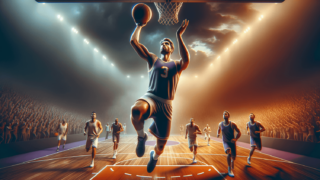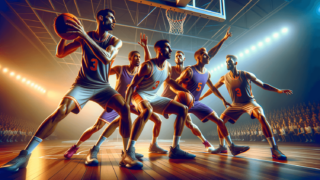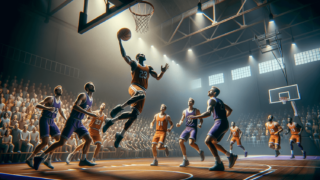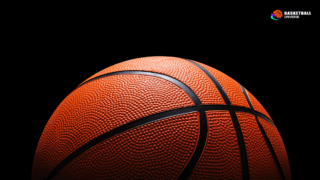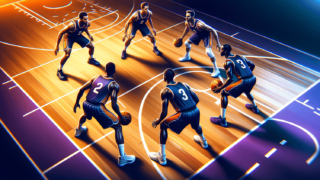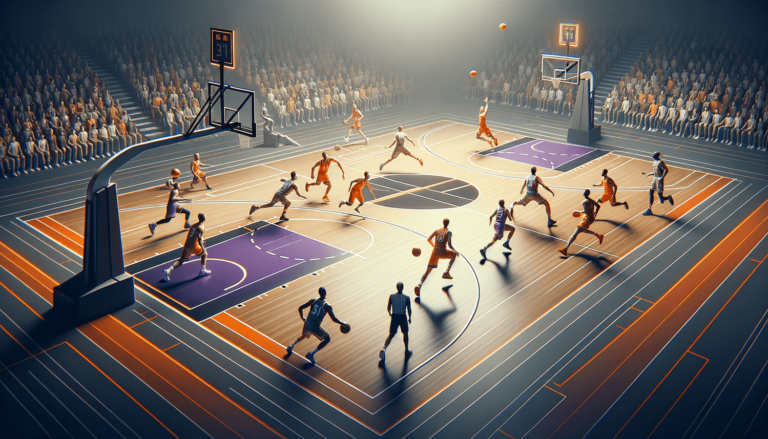
How to Improve Your Basketball Court Awareness?
Written by: Basketball Universe
Last updated:

For aspiring ballers looking to level up their game, few skills are as essential as developing your basketball court awareness. Good court vision not only allows you to rack up juicy stats but also to elevate your entire team’s performance. If you’re hungry to learn how to spy opportunities like a basketball savant, we’ve got your back! In this blog, we’ll dissect must-know principles, drills, and mental tactics, all expertly designed to sharpen your court awareness and make you the floor general that every team covets. So grab your sneakers, and let’s dive into the wonderful world of basketball intelligence!
How to Improve Your Basketball Court Awareness?
To improve your basketball court awareness, focus on developing your peripheral vision, practicing continuous communication with your teammates, studying game footage, and engaging in drills that simulate game scenarios. Enhancing your mental and physical skills, as well as understanding player positions and their roles on the court will result in better decision-making and anticipation of plays during games.
Master the Art of Peripheral Vision
Sharp peripheral vision is an indispensable asset when it comes to enhancing your court awareness. This skill allows you to see beyond just the ball and your defender, opening up a whole new world of opportunities during gameplay. The following tips and drills will help you hone your peripheral vision:
1. The Ball & Letter Exercise
Position a large letter or number on a wall, and place a chair a few feet away facing the letter. Now sit and hold a basketball at arm’s length, horizontally from the centre of your vision. Practice shifting your focus between the letter and the ball without moving your head. Repeat for a few minutes at a time to train your eyes to be more aware of things in their peripherals.
2. The Peripheral Dribble
In this drill, you dribble with your dominant hand with a defender while shielding the ball with your non-dominant hand. Instead of staring directly at the ball, try to keep an eye on the defender’s movements using your peripheral vision. This will help you adapt to sensing movement without relying on direct vision and increase your spatial awareness on the court.
Develop Strong Communication Skills
Powerful communication skills can significantly improve your basketball court awareness. Consistent dialogue with your teammates will help you anticipate where they are, and what they might do, during the game. Communication should be both verbal and non-verbal, such as by using hand gestures or body language. Here are some tips to help you develop your communication skills on the basketball court:
1. Speak Up During Practice
Use practice sessions to get into the habit of constant communication. Keep talking to your teammates even during drills or less competitive moments. This will make open communication feel more natural and seamless during actual games.
2. Pick Out Specific Cues
Identify specific words or phrases that represent certain plays or situations. Having well-defined signals will help you and your teammates react quickly and coordinate more effectively.
Study Game Footage & Analyze Plays
One of the best ways to improve your basketball court awareness is studying game footage. Watching film allows you to analyze play patterns, identify team tendencies, and understand individual player habits. This knowledge comes in handy when trying to predict what the opposition might do next, or spotting opportunities to make game-winning plays. Here are a few tips to make the most of your film study:
1. Make Personal Notes
As you watch footage, jot down observations about opposing players – their dominant hand, preferred moves, weaknesses, etc. These notes will serve as reminders and help you exploit their vulnerabilities during games.
2. Break Down Opponent Plays
Studying your opponents’ plays will help you anticipate their movements on the court. Focus on their offensive and defensive strategies, pressing and zone defense, and how they run plays to score or create opportunities. This knowledge will be invaluable when trying to disrupt or respond to their actions during a game.
Engage in Game-Situation Drills
Game-situation drills are fantastic tools to help develop your basketball court awareness. By simulating the fast-paced and strategic nature of the game, you can practice reading the court and making instinctive decisions. The following drills are excellent for improving court awareness:
1. The Full-Court Scrimmage
Playing in a full-court scrimmage allows you to practice reading the floor and adapting to different situations, while also handling the physical demands of the game. Focus specifically on anticipating plays, communicating with teammates, and making split-second decisions.
2. The 3-on-2 Fast Break Drill
This drill involves three offensive players running a fast break against two defenders. The offensive team must exploit the numerical advantage by reading the defense correctly and making smart passes to create a good scoring opportunity. Similarly, the defenders need to be aware of every possible passing option and have their hands up, ready to intercept or contest any shot.
Improve Your Basketball IQ
Having a high basketball IQ involves understanding the game on a deeper level, recognizing player positions and their roles, and being quick with decision-making. A sound basketball IQ will work wonders for your court awareness. The following tips will help you become a more intelligent player:
1. Learn From the Greats
Watch games featuring some of the best playmakers in basketball history, like Magic Johnson, Steve Nash, and Chris Paul. Observe their court vision and decision-making processes, and strive to incorporate their strategies into your own game.
2. Understand Offensive & Defensive Schemes
By grasping the intricacies of various offensive and defensive schemes, you’ll be better equipped to anticipate the flow of the game. This understanding will help you predict opposing team movements and respond effectively, thus improving your court awareness.
Stay Attuned to the Game’s Pace
Staying in tune with the game’s pace by adjusting the speed of your reactions and processing information is vital to improving your court awareness. Here are two tips to maintain this focus:
1. Control Your Breathing
By controlling your breath, you can think more clearly and reduce anxiety, allowing you to assess the game’s pace more effectively. Noticing your breath and taking slow, deep breaths will also help you maintain your composure during crucial moments.
2. Monitor Player Movement
Keep an eye on player movement across the court. Pay attention to your teammates’ and opponents’ positions, the ball handler’s intentions, and potential screens or off-ball cuts. This vigilance will allow you to spot opportunities for steals, open shots, or passes.
Cultivate Mental Toughness
Exceptional basketball court awareness demands mental toughness. Being mentally strong allows you to make accurate decisions under pressure and remain unshaken despite setbacks. Here are three strategies to develop mental strength:
1. Set Specific Goals
Before a game or practice session, set specific goals related to court awareness. For instance, aim to accumulate a certain number of steals or assists, or have a turnover-free quarter. Such goals will keep you focused on making smart decisions during the game and improve your awareness on the court.
2. Overcome Adversity
Accept that in basketball, setbacks are inevitable. Embrace each challenge and view them as opportunities for growth. Rather than dwelling on mistakes, mentally reset and determine what you can do better moving forward.
3. Visualize Success
Visualization can play a vital role in strengthening your mental game. By envisioning yourself making smart decisions and drives on the court, you can increase confidence and the likelihood of executing those plays in real situations.
Integrating these techniques and strategies into your training regimen can greatly enhance your basketball court awareness. With dedication, persistence, and focus, you’ll soon find yourself making clutch plays and transforming into the court general your team can rely on.
Building a Strong Foundation: Fundamental Skills
As you work on improving your basketball court awareness, it’s essential to build a strong foundation by focusing on fundamental skills. These key abilities will enable you to handle the ball with confidence, making split-second decisions easier during games. Here are some key fundamental skills to develop:
1. Dribbling
Practicing ball-handling skills is vital in becoming a versatile basketball player. When your dribbling ability is consistent and effective, you will be able to keep your head up to scan the court for opportunities, rather than focusing on the ball.
2. Shooting
Developing a reliable shooting touch can help create more scoring opportunities for yourself and your teammates, further enhancing your court awareness. A consistent shooting range forces defenders to play closer to you, which in turn opens up passing lanes and can improve your team’s overall court spacing.
3. Passing
Working on various passing techniques, such as bounce passes, chest passes, and overhead passes, will enable you to deliver the ball to your teammates in any situation. The better your passing skills, the more options you have, amplifying your ability to find teammates in favorable positions.
4. Defense
Strong defensive skills contribute to your court awareness, as anticipating your opponents’ movements is essential. Work on your footwork, stance, and staying low, maintaining an active presence on the court to keep track of both the ball and your assigned player.
Scouting the Opposition
In addition to improving your on-court skills and awareness, gathering information about the opposing team can give you an edge during games. Casting a careful eye on your opponents can unlock valuable insights into their style of play and tendencies, allowing you to anticipate their moves and shore up your court awareness. Consider the following tips:
1. Look for Patterns
Pay close attention to opposing players during games or scouting footage, and try to identify any patterns in their strategy or individual player movements. Taking note of these patterns can give you valuable foresight when you face them on the court.
2. Exploit Match-Up Issues
Study the opposing team’s lineups and identify any potential mismatches that could be exploited. Utilize these mismatches to your advantage by calling specific plays or positioning your teammates strategically on the court.
Importance of Physical Fitness
Maintaining high levels of physical fitness is critical for sustaining focus and court awareness over an entire game. Building strength, speed, and endurance will contribute to your ability to make smart plays and maintain concentration during crucial moments. Consider incorporating the following exercises into your routine:
1. Cardiovascular Training
Include regular cardiovascular exercises, such as running, cycling, or swimming, to help build your endurance. This will enable you to stay focused and maintain high court awareness, even during intense or overtime periods.
2. Strength Training
Strength training, including weightlifting or bodyweight exercises, can help boost your overall athleticism and power on the court. A strong and agile body is more effective at executing precise movements and maintaining awareness, regardless of the game’s pace and demands.
By combining attention to fundamental skills, scouting your opponent, maintaining physical fitness, and applying the tips provided earlier in this article, you will significantly enhance your basketball court awareness. Remember, true improvement depends on your dedication and persistence, so stay focused and enjoy your journey to becoming the ultimate basketball player.
Frequently Asked Questions
Are you still curious about how to improve your basketball court awareness? We’ve assembled a list of frequently asked questions to help address any lingering thoughts or queries. Dive into these FAQs to gain a deeper understanding of basketball court awareness and the steps involved in refining this crucial skill.
1. How long does it take to improve basketball court awareness?
Improving basketball court awareness varies from player to player, depending on factors such as experience, natural aptitude, and the time dedicated to practice. With consistent effort, you should begin to see noticeable improvements within several weeks to a few months.
2. Can playing other sports help to improve court awareness in basketball?
Yes, participating in other sports, particularly those that require strategic thinking and spatial awareness like soccer or football, can have a positive impact on your basketball court awareness. These sports can help develop skills like communication, anticipating plays, and quick decision-making that are transferable to basketball.
3. What is the most important aspect of basketball court awareness?
There is no single “most important” aspect of court awareness, as it is a combination of multiple skills and mental attributes. However, mastering peripheral vision, effective communication, emphasis on in-game situations, and building a high basketball IQ are all critical factors in improving court awareness.
4. Is basketball court awareness solely developed during games or can it be improved during practice sessions?
While game experience is invaluable for improving basketball court awareness, practice sessions also provide excellent opportunities to hone this skill. Conducting drills that simulate game situations, working on fundamental skills, and emphasizing communication will all contribute to enhancing your court awareness.
5. How important is basketball court awareness compared to other skills like dribbling, shooting, or defense?
Basketball court awareness is a fundamental skill that complements and enhances all other aspects of your game. While it’s essential to develop other individual skills like dribbling, shooting, and defense, having good court awareness can significantly improve your decision-making and overall performance on the court.
6. Can height and wingspan advantage a player when it comes to court awareness?
Height and wingspan can provide certain advantages for players, such as increased range and better perspective over the court, but court awareness is primarily a mental skill. Players of any size can develop excellent court awareness through consistent practice and focus on essential techniques.
7. Does age impact the ability to develop basketball court awareness?
While young players may have some advantages in terms of adaptability and learning speed, players of any age can significantly improve their court awareness. Dedication, persistence, and the right guidance are key to achieving noticeable improvements in your basketball court awareness.
8. How can a coach help a player improve their basketball court awareness?
Coaches play a crucial role in a player’s development, helping identify areas for improvement, providing constructive feedback, and designing drills to specifically target court awareness. By providing the necessary guidance, support, and motivation, a coach can greatly contribute to enhancing a player’s basketball court awareness.
9. Do all players need to have great basketball court awareness, or is it more important for specific positions like point guards?
While court awareness is an essential attribute for playmakers like point guards, it benefits players of all positions. From recognizing scoring opportunities to anticipating defensive adjustments, every player on the court can improve their performance through elevated court awareness.
10. How can I measure my improvement in basketball court awareness?
Improvement in basketball court awareness can be measured in various ways, including tracking stats such as assists, steals, and turnovers, as well as paying attention to non-statistical factors like reaction time, anticipation of plays, and communication. Consistent self-evaluation and feedback from coaches can provide valuable insights into your progress.
Featured Posts
- No pillar pages found.
